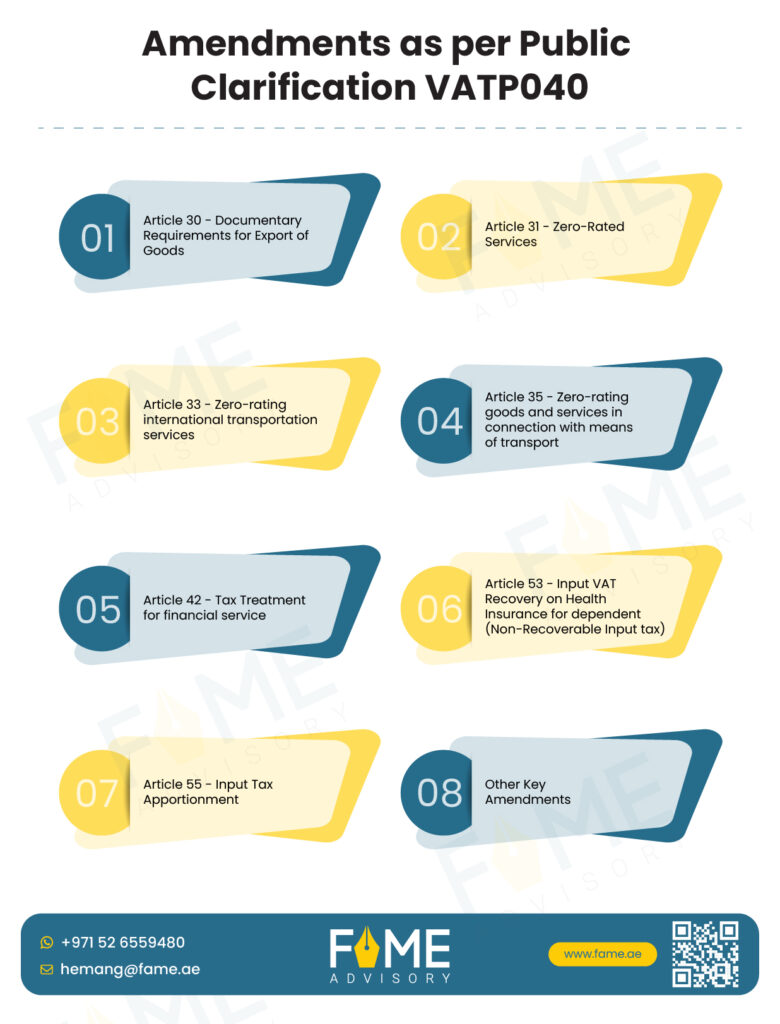
The Federal Tax Authority (FTA) in the United Arab Emirates (UAE) has released its Value Added Tax (VAT) on Amendments to the VAT Executive Regulation which were effective from 15 November 2024. To provide further clarity, the FTA published Public Clarification VATP040 regarding these amendments on March 14, 2025.

Clarifications on changes in documentary requirements for export of goods (Article 30)
The recent Public Clarification has provided clarity on the amendments to Article 30 of the Executive Regulation, which aim to streamline the proof requirements for suppliers applying the zero-rate for exporting goods, whether directly or indirectly.
The updated regulations allow taxable persons exporting goods to retain any of the following documentation:
- Customs declarations and commercial evidence verifying export.
- Shipping certificates and official proof of export.
- For goods under customs suspension as per the GCC Common Customs Law, customs declarations confirming the suspension status.
Starting from 15 November 2024, additional official evidence forms will be accepted, including:
- Export certificates issued by local customs authorities, confirming the goods have departed the UAE.
- Clearance certificates from local customs or relevant UAE authorities.
- Certified documents from authorities in the destination country confirming the goods’ entry. These documents must clearly display official stamps or seals and be either in Arabic or English, or include a certified translation should be retained in one of these languages.
It is important to note that exports made before 15th November 2024 will still be subject to the previous documentary evidence requirements under Article 30. Before this date, both a customs declaration and an exit certificate will continue to be required as proof of export
Zero-rated services (Article 31)
Recent changes to Article 31 of the Executive Regulation clarify when services provided to non-residents do not qualify for zero-rating under UAE VAT law. The term “personal” has been removed from “personal moveable assets,” meaning any moveable assets located in the UAE at the time of service now disqualify the supply from zero-rating.
The following services supplied to a non-resident do not qualify for zero rating under this Article:
- Installation Services related to goods supplied by others; the place where the service is performed.
- Transport Services Provided to lessees who are not taxable persons; the place where the means of transport were placed at the disposal of the lessee.
- Hospitality Services: Restaurant, hotel, and catering services; at the location of service performance.
- Cultural and Educational Services; place where the services are performed.
- The supply of services that are directly connected with real estate located in the UAE.
- Transportation Services; place where the transportation begins.
- Telecommunications and Electronic Services; where the services are enjoyed
Zero-rating international transportation services (Article 33)
The Public Clarification outlines the VAT treatment of international transportation services under Article 33, emphasizing conditions for applying the zero-rate.
- Domestic transportation of goods can be zero-rated only when it is supplied by the same entity that provides the international leg of the transport. If different parties handle each segment, the domestic portion does not qualify for zero-rating.
- Zero-rating applies only to services provided directly to the recipient of the international transport. Any supporting services offered to third parties (e.g., warehousing or handling provided to someone other than the transport recipient) are subject to the standard VAT rate.
Zero-rating goods and services in connection with means of transport (Article 35)
Article 35 is hereby amended to specify that only the following services, when supplied directly in connection with a qualifying means of transport, shall be eligible for zero-rating:
- Repair Services: when the repair services are carried out onboard.
- Maintenance Services: Includes inspection, testing, cleaning, and similar services if carried out onboard.
- Conversion Services: Should maintain compliance with conditions of Article 34 on post-conversion.
Tax Treatment for financial service (Article 42)
The recent amendment to Article 42(2) introduces additional categories of financial services. However, it is important to emphasize that inclusion under Article 42(2) does not automatically qualify a service for VAT exemption.
The actual application of the exemption is determined under Article 42(3), which sets out the specific conditions that must be met. Only services that satisfy these criteria are eligible for VAT exemption, regardless of their listing in Article 42(2).
The following newly added categories in definition of financial services has been clarified through this public clarification –
- Management of investment funds – Services provided by an independent fund manager to funds licensed by the UAE authority, including the management of the fund’s operations, the management of investment for or on behalf of the fund, monitoring and improvement of the fund’s performance, are exempt from VAT.
- Transferring ownership of virtual assets and conversion of Virtual Assets – This includes virtual currencies like bitcoin and conversion of virtual assets. These services are exempt from VAT retroactively from 1 January 2018.
- Keeping and managing Virtual assets – Services related to keeping and managing virtual assets (e.g., managing crypto wallets) are taxable if supplied in the UAE for an explicit fee, commission, or similar charge. Crypto currencies are a subset of virtual currencies and from a VAT perspective are not regarded nor treated as money.
It clarifies that Investment fund management services, transfer of virtual assets/currencies and conversion of virtual assets are considered as exempt financial services from VAT. Therefore, taxable person only engaged in these supplies has to assess the recoverability of input VAT and necessity of VAT-Deregistration.
Input VAT Recovery on Health Insurance for dependent (Article 53 - Non-Recoverable Input tax)
This article is amended to allow recovery of input VAT for health insurance, including enhanced health insurance for employees and their dependents within the limit of one spouse and three children under the age of 18.
The public clarification has clarified that this amendment is only effective from 15 November 2024 and shall not be applied retrospectively.
For example, if the employer paid health insurance premiums in January 2024 in respect of the full calendar year, only the VAT incurred on the portion relating to the period 15 November to 31 December 2024 may be recovered to the extent the employer incurs these costs to make taxable supplies, and provided the relevant supporting documents are retained.
Input Tax Apportionment (Article 55)
Article 55 now clarifies that standard input tax apportionment also applies to government entities and charities. Notwithstanding the amendments introduced under Article 55(7)(a)—which clarify the “sum of input tax for the tax period”, the simplified input tax apportionment method as outlined in “VATGIT1” still be used.
Other Key Changes
Further clarifications have been issued regarding the updated VAT Executive Regulation. Below is a illustrative list of the topics that have been addressed:
- Tax registration cancellation and deregistration – The authority has the right to cancel a VAT registration of a taxpayer under certain circumstances (e.g., registration requirements not met) and also now deregister entities that have applied but not completed deregistration or no longer meet VAT registration conditions.
- Profit margin scheme – The definition of “purchase price” has been clarified to includes all costs and fees incurred in addition to the price of the goods.
- Tax invoice requirements – New timelines have been introduced to issue summary tax invoices (in case of multiple supply to same person). Now, business has 14 days from the end of calendar month to issue summary tax invoices.
- Tax Credit Note – FTA clarify the treatment of multiple tax credit notes issued for the same tax invoice. In such cases, the “value of supply shown on the tax invoice” in any subsequent credit note should reflect the adjusted value after accounting for the previous credit note(s).
- Zero-rating healthcare services- Article 41(4) of the Executive Regulation was amended to clarify that not only a supply, but also an import of the goods referred to in that Clause may qualify for zero-rating
It is important for all taxpayers to familiarize themselves with the published changes and clarifications, and assess their impact on their business. Businesses should conduct an internal review to determine whether they are in compliance with the updated Executive Regulation and Public Clarification.






